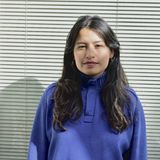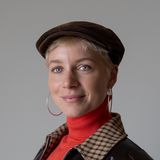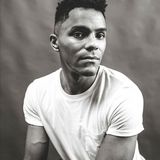In this three-part Designing Cities for All: RE-generation series RE-imagining Borders , DCFA Fellows Joris Lechêne and Lucia Kula delve into the concept of made-up boundaries, borders and binaries, and their implications in the world. How does thinking in dualisms influence our public spaces, systems and (hi)stories? Where does the concept of the (literal or metaphorical) border originate from and who has the power to install and enforce them? And why is it so important to break away from this simplistic worldview?
The second episode explores the dichotomy of Demands vs. Desires . We discuss ‘ desire paths ‘: shortcuts in public spaces that people prefer to the paved and regulated routes , for instance in parks. How are desire paths a perfect depiction of the people voting with their feet and what do they tell us about societal boundaries., who sets them, and why?
About the DCFA Fellows
Joris Lechêne is a Franco-British social communicator who has lived and worked in five countries and three continents. Black, queer, foreigner and neuro-divergent, Joris has spent most of his adult life disentangling his multiple marginalized identities in a world that simultaneously considers him both an out- and an insider. As a Social Media Influencer and Anti-racism, Bias and Privilege trainer, he draws on his experience with the combination of the various identities at the intersections of ‘race’, neuro-diversity, class and sexuality. Joris uses this unique vantage point from which to communicate and explain social concepts and speak up on the topics of systemic inequalities, discrimination and bias.
Dr. Lucia Kula , SFHEA is an International Lawyer and Lecturer in Law and Gender at SOAS, University of London. Her research adopts an interdisciplinary approach to law, borders, gendered violence, and decolonization. She is a former refugee from Angola and writes on law and forced displacement issues and identity in the African diaspora, with a focus on critically analyzing the experiences of women and other marginalized communities. She convenes the Gender Studies and Law Programme, and she is the Widening Participation Lead for the School of Law within SOAS. She also consults for other Higher Education institutions in the UK on Race Equity and Decolonising The Academy.
About the Speakers
Bárbara Oliveira Soares is a researcher passionate about unraveling the complexities of (in)justice in urban environments. Currently, she is completing a Research Fellowship at Urban Cycling Institute, where she explores the realm of mobility justice in the case of Amsterdam. Her research delves into the intersections of social equity, urban planning, and sustainable transportation to uncover potential mobility policies to further inclusive and accessible cities. Her previous research studied the safety of women in the nighttime, by analysing the journeys of diverse women at night. Here, she developed an understanding of the unique challenges faced by women in urban spaces, particularly during nighttime, shedding light on the diversity of lived experiences that are often overlooked in traditional urban planning.
Ilke Gers is a visual artist from Aotearoa New Zealand, based in Rotterdam. She makes installations and works with text, drawing, print and publishing to explore the relationship between the body, movement and language. Her work intervenes in standardised forms of communication and circulation, through open-ended processes that are sensitive to spatial conditions, physical interaction and time. She studied at the Masters programme Werkplaats Typografie, and was artist in residence at the Jan van Eyck Academie (2014-2015). She has taught, given lectures and workshops at various institutions throughout Netherlands. Her work is currently exhibited at Tabakalera (Donostia-San Sebastian), Into Nature outdoor biennial (Drenthe) and LLS Paleis (Antwerp). Recent exhibitions include the Hayward Gallery at Southbank Centre (London), NDSM Werf (Amsterdam), TENT (Rotterdam), 019 (Ghent), and Decoratelier (Brussels), and she has upcoming projects at Vleeshal (Middelburg) and Border Buda (Brussels, Vilvoorde and Machelen).
About Designing Cities for All: RE generation
Over the first two years of Designing Cities for All (DCFA), we’ve learned about exclusion by design and the (re)design of inclusive cities. Along the journey, a certain question kept popping up: what exactly does ‘for all’ entail? After focusing mostly on the ‘who’ over the past two years, DCFA is rebooting as Designing Cities for All: RE-generation . This way around, the series is also incorporating the ‘what’ by looking through the fresh lens of regenerative design . This emerging field might very well be a promising answer to the challenges of our time, as it focuses on the design of products, services, systems and processes that lead to both social and ecological recovery and that keeps the systems healthy.
About desire paths


Joris Lechêne explains the concept of desire paths and 'voting with your feet' in this Instagram reel.

When cities lack the paths pedestrians need, people vote with their feet.

Desire lines are “paths & tracks made over time by the wishes & feet of walkers, especially those paths that run contrary to design or planning. Free-will ways”. In recent years, the interest of urbanists in desire lines has grown, as they offer a unique opportunity for planners to adapt the built environment according to the wishes of people.

Ireland's Victorian and Edwardian public parks were landscapes in which normative models of class, gender, and colonial identities were constructed. This paper will explore how the materiality of these landscapes — their drinking fountains, railings, bandstands, and benches — facilitated forms of social practice that underpinned an ideology of improvement, creating regulated spaces of display and consumption in which the natural world and the urban populace could be objectified, domesticated and their moral worth evaluated. Yet, parks have always been sites of transgression so that from their earliest years, vandalism and other forms of subversive behavior created alternative narratives of identity.











